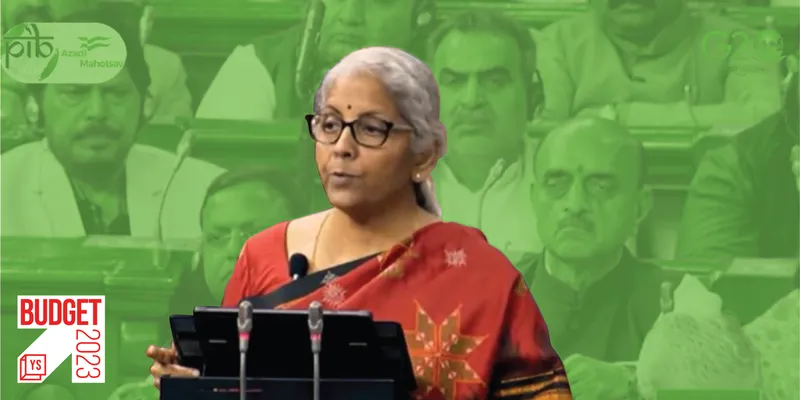Budget's formula: Jobs = capital expenditure x tech
The government expects increasing the outlay in capital expenditure will also attract private investments.
The government has increased its capital investment outlay for the coming financial year in the hopes of giving economic growth and job creation a big push.
“Capital investment outlay is being increased steeply for the third year in a row by 33% to Rs 10 lakh crore, which would be 3.3% of GDP. This will be almost three times the outlay in 2019-20,” Finance Minister Nirmala Sitharaman said during the Budget 2023 presentation on Wednesday.
The government believes this increase in capital expenditure (capex) will also encourage further investments from the private sector along with providing a cushion against the present global macroeconomic headwinds.

Union Finance Minister Nirmala Sitharaman
In any economy, government spending is a major trigger to boost consumption and growth. The Economic Survey released a day ahead of the Budget noted that the central government's capex, which increased by 63.4% in the first eight months of FY23, was an economic growth driver and has been crowding-in private capital investment since the January-March quarter of 2022.
The crowding-in effect is observed in economies where government spending is high, which creates favourable economic conditions for private firms to invest.
Unfavourable global macroeconomic headwinds in terms of rising interest rates, high inflation, and the Russia-Ukraine conflict have also impacted the Indian economy. The Economic Survey has estimated that though India will remain the fastest-growing major economy, the GDP will grow at 6.5% in FY24—lower than the 7% projected for the current fiscal.
Given the backdrop, the increase in capital expenditure is a welcome step for the economy as a whole and the corporates in particular.
As the finance minister noted in her Budget speech, investments in infrastructure and increasing productive capacity have a large multiplier effect on growth and employment. After the prolonged period of subdued growth during the pandemic, private investments are growing again, she added.
The Union Budget has broadly outlined the government's plans to take the economy forward, especially by leveraging technology. For example, the Budget mentions setting up three centres of excellence on artificial intelligence (AI) in top educational institutions.
These AI centres are expected to see participation from leading industry players to conduct interdisciplinary research, develop cutting-edge applications, and bring scalable problem solutions in the areas of agriculture, health and sustainable cities.
Puneet Gupta, MD, NetApp India said, “The government’s announcement of setting up 100 5G labs and the development of three Centers of Excellence for AI will go a long way in unleashing the digital potential of the country. In a world that is driven by data and AI, we see numerous and infinite opportunities ahead of us.”
Edited by Kanishk Singh








